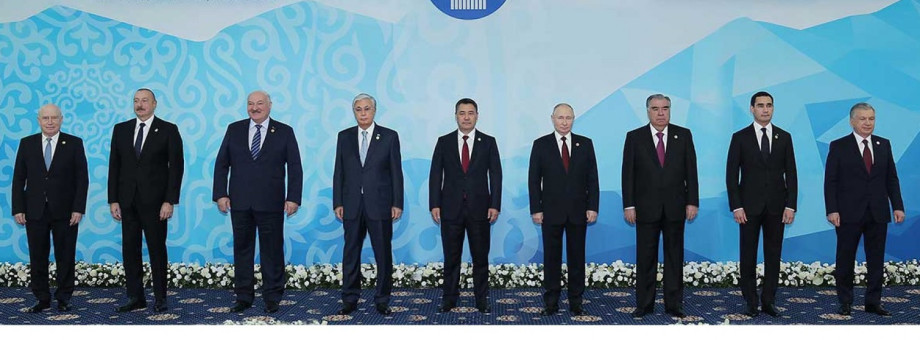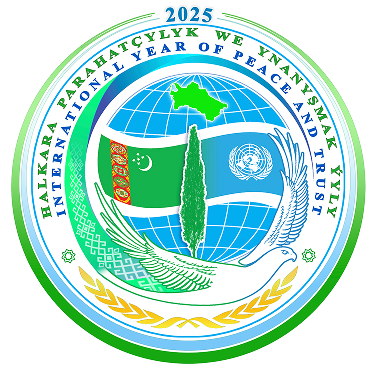THE PRESIDENT OF TURKMENISTAN TOOK PART IN A MEETING OF THE COUNCIL OF HEADS OF STATE OF THE CIS

On October 13, 2023, President of Turkmenistan Serdar Berdimuhamedov, as part of a working visit to the Kyrgyz Republic, took part in the regular meeting of the Council of Heads of State of the Commonwealth of Independent States.
The meeting, chaired by the President of the Kyrgyz Republic Sadyr Japarov, was also attended by the President of the Republic of Azerbaijan Ilham Aliyev, the President of the Republic of Belarus Alexander Lukashenko, the President of the Republic of Kazakhstan Kassym-Jomart Tokayev, the President of the Russian Federation Vladimir Putin, the President of the Republic of Tajikistan Emomali Rahmon, the President of the Republic of Uzbekistan Shavkat Mirziyoyev and CIS Secretary General Sergey Lebedev.
The President of Kyrgyzstan thanked everyone for participating in the Summit, emphasizing the importance of the issues on the agenda of the summit meeting in the context of further development of cooperation in the Commonwealth space, effective implementation of the existing solid potential in various fields, deepening integration economic and humanitarian ties.
During his speech, President of Turkmenistan Serdar Berdimuhamedov noted that the current meeting is a continuation of a systematic and multifaceted dialogue within the CIS on priority issues of the global and regional agendas, and expressed confidence that the interaction of states in the Commonwealth format is an important factor in ensuring conditions for successful progress cooperation on current topics.
As you know, our country, being an associated member of the CIS, participates in its activities in accordance with its neutral status recognized by the UN. Our proposals put forward within the Commonwealth fully meet the initiatives of Turkmenistan declared within the Community of Nations, said President Serdar Berdimuhamedov. This, first of all, relates to issues of ensuring peace and security.
As the head of the Turkmen state emphasized, recent international events clearly demonstrate that maintaining peace, strengthening security and stability will be the main priorities of world politics. In this context, today Turkmenistan, taking into account the realities and trends of global development, proposes to begin discussing the possibilities of developing a Global Security Strategy under the auspices of the UN. This initiative was announced during the 78th session of the General Assembly.
Specifying the three important directions of this Strategy, the first of them was the President of Turkmenistan, outlining the principles of preventive diplomacy as a tool for preventing and neutralizing conflicts and threats, eradicating the causes that give rise to them.
The second key component of the Strategy is the use of the potential of positive neutrality as a political and legal category, which serves as the most important factor in the peaceful resolution of disputes and contradictions through the use of the entire arsenal of diplomatic means and methods.
Thirdly, it is necessary to take into account in the Strategy the importance of restoring a culture of trusting dialogue as a guarantee of ensuring peace.
Attention was also focused on activities to further strengthen multilateral partnership within the framework of the Group of Friends of Neutrality, created on the initiative of the Turkmen side within the UN. Turkmenistan proposed holding the next high-level meeting of the Group in Ashgabat in December this year, followed by the organization of an international conference in 2024, and hopes for active interaction between the CIS member states within the framework of the above-mentioned initiative.
Expressing confidence that the countries’ interests will coincide when discussing the possibility of establishing an Institute of Neutrality and Security, designed to become an effective platform for analytical research on neutrality and related issues, the President of Turkmenistan confirmed his readiness to provide all the necessary infrastructure and conditions for this in Ashgabat.
Relevant for the format of cooperation within the Commonwealth are Turkmenistan’s proposals to create a Conference/Dialogue on Security in Central Asia under the auspices of the UN. The goal of the Meeting is to develop approaches and solutions aimed at bringing together and synchronizing the efforts of the countries of Central Asia and other interested states, international organizations, financial and economic institutions in ensuring sustainable, conflict-free development of the region. The Turkmen side invites the Commonwealth countries to take part in the first meeting of the Conference in Ashgabat next year.
The President of Turkmenistan expressed confidence in the relevance for the Commonwealth states of projects initiated by the Turkmen side to diversify energy, transport and communication components in the context of the development of large-scale infrastructure corridors North-South and East-West. In this regard, great importance is attached to increasing logistics capabilities with transport links in the Caspian-Black Sea and Asia-Pacific regions, as well as with the Gulf and Middle East countries.
Stressing that close humanitarian interaction between the peoples of our countries continues to be an important and unifying factor of partnership in the CIS format, the head of Turkmenistan noted the presence of accumulated solid experience in the field of science and education, tourism and sports. Cooperation in the field of cultural exchanges is also an important aspect.
At the end of his speech, the President of Turkmenistan confirmed our country’s strong commitment to further interaction within the CIS.
As part of the exchange of views that took place during the Summit, the results of the Commonwealth’s activities for the current year were analyzed, priority tasks and plans for the coming period were specified, current aspects of regional and international issues were discussed, and a number of organizational and other relevant issues were considered.
As a result of the Summit, a number of documents were adopted.


 NEWS
NEWS